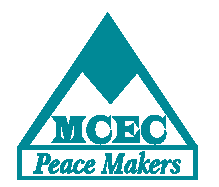The Building Peace in the Schools Program is currently offered in Pitt, Duplin, Sampson, Jones and Wayne Counties.
Peer Mediation (Pitt, Duplin, Sampson, Jones and Wayne)
In school-based
Peer Mediation, students are trained to mediate conflicts between their peers.
A school-based peer mediation program involves the selection of a core base of students deemed appropriate to become future peer mediators. The selected students participate in a 12-hour training over the course of a couple of weeks. During training students are provided with a training manual, watch a video of a peer mediation, do practice worksheets, and participate in role-playing in preparation of becoming successful and effective peer mediators. Students also learn about the importance of confidentiality, and are encouraged to make up any missed work due to training. After all participants complete the training, the staff (i.e., teachers, administrators, and students) can make referrals to the designated School Peer Mediation Coordinator (in most cases the school counselor).
Mediations are typically held in a private setting/room, with the School Peer Mediation Coordinator nearby.
Peer Mediation has wonderful benefits, and can be used as an alternative resource for the schools and can decrease office referrals.
Conflict Resolution (Pitt, Duplin, Sampson, Jones and Wayne)
Through our Conflict Resolution
program, students in Grades K-12 learn about different conflict management styles, as well as positive alternatives and realistic tools to help them manage conflicts on their own. Students and staff can receive services either through
classroom presentations/workshops, school assemblies, and/or small groups.
For small groups, the coordinator/facilitator meets with selected students for 6-8 weeks, and in 30/45-minute sessions. As much of the learning is done through role-playing and discussion of individual conflicts, group size is limited to 4-6 students. Classes take place on the school campus. Students must have parental permission to attend and students must be willing to make up missed class work.
Social Skills
Social Skills Classes are designed to help at-risk youth overcome their challenges. The classes serve youth ages 6-17 youth who have demonstrated behavioral problems at school and have poor social and anger management skills. The classes help students learn to identify their anger triggers, learn to manage their emotions, and develop appropriate communication and problem solving skils. Students learn positive conflict resolution skills which can easily be applied in school, at home, and in the community.
Duplin County youth can be referred by Juvenile Court Counselors, School Resource Officers, and/or School Administrators including the principal, assistant principal, guidance counselor, and social worker. Youth who have previous involvement with Juvenile Court or are currently on Juvenile Probation have priority.
Youth admitted into the program participate in 6-10 sessions (the exact number of trainings vary by grade level). The intake process and program activities take place over a target length of 10 weeks, with the youth receiving a minimum of 12 hours of service. These service hours include the trainings and follow-up sessions with the youth and parent/guardian.
Social Skills Classes take place at the student’s school during a non-core class period, as permitted by the school administration.
Mentor Program (Pitt, Sampson & Jones)
The Mentor Program
matches adult volunteers with at-risk youth ages 9 & up for one-on-one mentoring and small group mentoring events. The goal of the mentors is to help to increase social skills and positive decision making
to reduce the likelihood of these youth offending or re-offending. The mentor model also assists the youth and his/her family with additional resources as well as provide any additional support.
Individual service plans are created for each youth to determine the specific needs of the youth . The mentors meet with the youth approximately 2 hours per week to work on positive youth development, skill building activities, homework, and recreation. Mentoring activities occur at the schools at the and/or in the community (i.e., library, parks and recreation centers, etc.).
Evidence based curriculum materials are utilized for skill building lessons.
All program activities require prior approval from the Program Manager.
